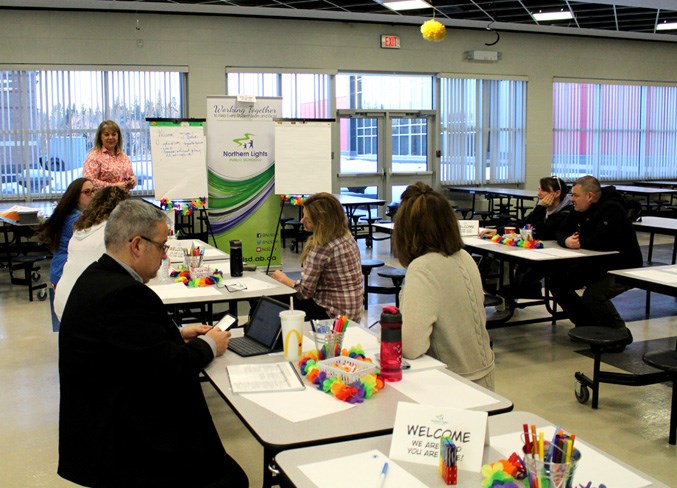Northern Lights Public Schools (NLPS) opened the floor to feedback from stakeholders during their community engagement meetings.
Since February, NLPS has been conducting sessions to ask parents, staff, and students across the division for their opinions on what’s working and areas they’d like to see improvement in.
Superintendent Rick Cusson noted the information gathered is crucial for NLPS moving forward.
“We can take a look at the data and try to interpret what it means, but that only provides us with part of the story. For us, the humanistic side of things, we want to hear what people’s stories are, we want to be able to gather their input, more than the soft side you’ll never get in a survey. This allows us to really hear what our stakeholders are saying about things we want to improve on,” he detailed.
The final session for parents was held on Thursday, March 14 at Cold Lake High School.
When attendees were asked for their thoughts, parent Andrea Terletski noted the learning commons has greatly impacted the students in her child’s school.
“The library at Nelson Heights Middle School is going way better since they did some renovations in there. There’s a lot more engagement in regards to the literacy and use of it,” she explained.
While they’re still collecting the data from discussions, Cusson noted similar suggestions did emerge. They focus on the district’s Provincial Achievement Test (PAT) results, and the students scoring high for anxiety compared to the national average.
“Some of the common trends around our math skills and academics, as well as the social side of things with our kids, anxiety and support for them. That’s what our data is telling us, but it’s interesting to hear some of the stories that are coming out,” Cusson explained.
Parent Kelly Burt was pleasantly surprised with the increase in Grade 12 PAT scores.
“After seeing the Grade 9 (results), I thought they would be lower, but it’s pretty typical for what I hope to expect from my kid’s school,” she expressed.
In their annual student survey, those in attendance noted the numbers recorded for the anxiety were a little high. For Grades 4 to 12 in NLPS schools, 29 per cent of students had moderate to high anxiety levels compared to the national average of 16 per cent, while Grade 7 to 12 students scored 29 per cent compared to the national at 18 per cent.
“I think a large part of it could be environment. We’re engaging with the youth to be mentally aware of those mental problems,” noted Terletski. “They’re a lot more aware of what it is and what it could be.”
Overall, parents were pleased to see the division hosting engagement sessions.
Attendee Mike Lebrasceur believes it was a good experience and was happy to have the chance to share his comments.
“If they don’t hear from us, they won’t know whether or not they’re doing a good job,” he said.
NLPS trustee Karen Packard agreed.
“(Parents) are the ones with the kids every night. They’re the ones that know what’s happening in their homes, we don’t know that, we only know what we see. I just think they have a different insight than the staff do, and I think that’s why we ask for input from the parents, the staff, and the kids so we get a better picture of what’s going on.”
She added, “I heard people wanted to give input more often, so that’s something we’ll have to think about.”
Once all of the data is gathered, the information will be presented to the board of trustees to review as they map out their three-year education plan.
“Hopefully, what we’d like to do, is get two or three concrete priorities that we can laser focus on to try and improve over the next two to three years in our school division,” Cusson said.



